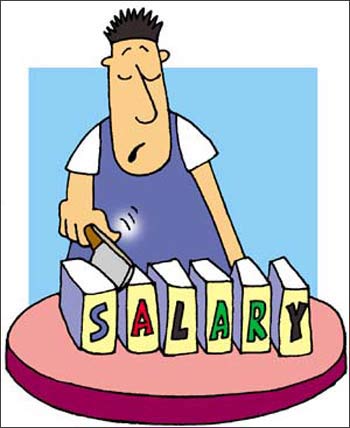 | « Back to article | Print this article |
Who would want to celebrate income tax?
You may not know this, but Saturday (July 24) was Income Tax Day. Before you start doing cartwheels, let me clarify that they are not going to announce a special rebate for all those who file their taxes honestly and in time; instead, they are going to celebrate the 150th anniversary of the income tax in India.
The coming year will be marked by the release of commemorative stamps and coins, and all future July 24ths will also be Income Tax Days -- or so an unsolicited e-mail informs me.
I don't know who would want to celebrate the creation of the income tax, other than the tax officials themselves (who must be the guys who doubtless have thought up this one).
Most official 'days' that are not honouring people (martyrs, mothers and fathers, for instance) are to mark the battle against an evil (Leprosy Day, for instance), or to promote something worth promoting (as with World Environment Day). But income tax?
You could say that the income tax should be celebrated because taxes are unavoidable, and the income tax is better than other forms of taxation because it is usually progressive (those who earn more pay more).
But others will argue the opposite: that taxing income is an impost on you for making a contribution to the economy, whereas tax should be on what you consume, not produce (hence a tax on expenditure).
Click NEXT to read on . . .
Who would want to celebrate income tax?
But my complaint is not about the income tax itself (which in India now has perfectly reasonable rates, thanks to Mr Chidambaram's 1997 Budget), but about the guys who administer the tax -- who are the people doing the celebrating.
If the Central Board of Direct Taxes bestirred itself to do a survey on how taxpayers view the taxman, it might find that taxmen are among the most abhorred of all the people who occupy government offices (next only to policemen, perhaps).
Talk to anyone who has faced a tax official and you will almost certainly get a volley of complaints -- usually about corruption and about irrational tax demands.
On the few occasions when I was called to appear before the taxman (many years ago, fortunately), I was asked variously to provide a job for the official's nephew, to buy his wife's painting, and so on; so I outsourced all future interviews to my chartered accountant, with strict instructions that no money was to change hands.
The result, of course, is that routine tax refunds get inordinately delayed, or you get strange notices on matters many years old. I once told the revenue secretary in the finance ministry that he was presiding over the most corrupt department in the government; he responded by asking whether newspaper owners didn't make money by dishonest means!
When that attitude prevails, don't expect change.
Click NEXT to read on . . .
Who would want to celebrate income tax?
What you probably don't know is that the tax guys actually have a 'citizens' charter'. This flowed from an initiative in the late 1990s, when the government decided to take a leaf out of the John Major government's book in Britain.
Every government ministry and department was asked to prepare a citizens' charter, and you can see them at goicharters.nic.in.
The Central Board of Direct Taxes has a charter too, dated July 24 (note the date) three years ago, and while it promises many good things (among them, timely refunds), it does not promise that the taxman will deal with you honestly.
In fairness, it has delivered substantially on one promise (to use 'non-intrusive and automated techniques' to ensure compliance), but I doubt that anyone who has been 'intruded' upon for whatever reason will want to join the celebrations.



